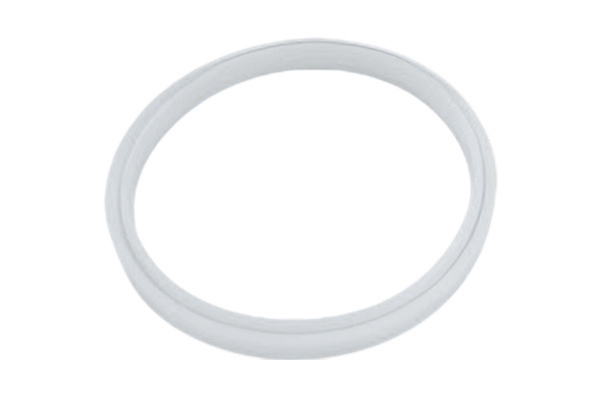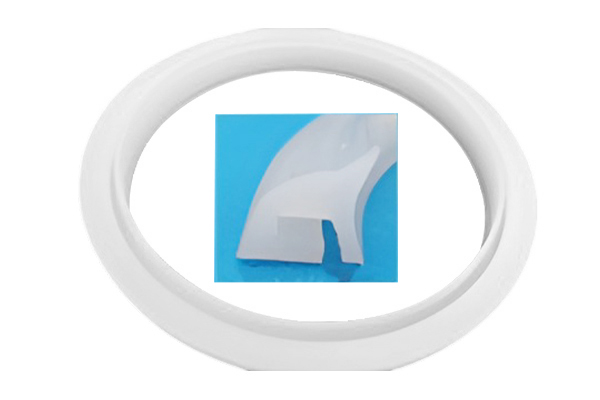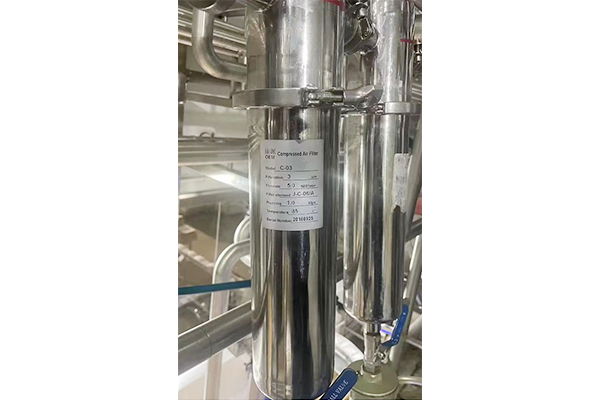Does the fermentation tank manhole seal prevent permanent deformation and maintain seal integrity after frequent opening and closing?
Release Time : 2025-09-04
Whether a fermentation tank manhole seal prevents permanent deformation and maintains seal integrity after frequent opening and closing is critical to its long-term reliable operation in demanding environments such as biopharmaceuticals, food brewing, and industrial fermentation. As one of the most frequently operated openings on a fermentation tank, the manhole performs multiple tasks, including feeding, sampling, equipment maintenance, internal cleaning, and process validation. With each opening and closing, the seal undergoes a cycle of compression, release, and recompression. If the seal material lacks elasticity or poor fatigue resistance, it will lose its resilience after repeated stresses, resulting in permanent compression deformation, a decrease in sealing force, and ultimately the formation of tiny gaps. These gaps may be imperceptible under normal pressure, but during steam sterilization, positive pressure fermentation, or negative pressure cleaning, they can become the source of leaks, disrupting the sterile environment, posing a risk of contamination, and even causing the failure of the entire fermentation batch.
Maintaining seal integrity lies in the material's high elasticity and structural stability. High-quality silicone sealing materials possess excellent resilience due to the flexibility of their molecular chain structure. When the manhole cover presses against the sealing ring, the material undergoes elastic deformation, filling the microscopic irregularities between the flange surfaces. When the bolts are loosened and the pressure is released, the material quickly returns to its original shape, ready for the next compression. This "memory" ensures that the seal maintains effective preload even after hundreds of opening and closing cycles, preventing seal failure due to material fatigue. This performance is particularly important in production lines that require daily or batch operations, as it directly impacts system availability and process continuity.
In addition, the cross-sectional design of the sealing ring also affects its deformation resistance. Appropriate geometric shapes, such as O-shaped, D-shaped, or rectangular cross-sections, evenly distribute stress under pressure, avoiding localized overcompression. High-quality molding ensures uniform sealing density, free of bubbles, cracks, or flash, eliminating structural weaknesses at the source. During installation, the proper fit of the sealing ring to the flange groove is also crucial. Overtightening will result in excessive initial stress and accelerated aging, while overloosening can easily cause distortion or extrusion. Precise dimensional matching ensures the seal is always within the ideal load range during operation, extending its service life.
The inherent chemical inertness and thermal stability of silicone further enhance its durability. During high-temperature steam sterilization, the seal experiences drastic temperature fluctuations and high humidity. If the material is not heat-resistant, it may harden, crack, or release low-molecular-weight compounds. Food-grade or pharmaceutical-grade silicone, however, is specially formulated to maintain stable physical properties under repeated thermal shocks, preventing fluctuations in sealing force due to thermal expansion and contraction. Its smooth and dense surface resists the absorption of residues, facilitating CIP cleaning and preventing dirt accumulation from corroding the sealing surface.
In actual operation, operating procedures also affect seal life. The tightening sequence and force of bolts should be uniform and cross-tight to avoid biased flange loading that could cause excessive stress on one side of the seal. Regularly inspecting the seal and removing impurities can effectively prevent scratches or embedded damage. For frequently used manholes, it is recommended to establish a replacement cycle and incorporate a preventive maintenance plan to ensure the sealing system is always in optimal condition.
Ultimately, the value of a fermentation tank manhole seal lies not only in its "seal" but also its "durable seal." It silently withstands the pressure between each opening and closing, safeguarding the sterile world within the tank with its material elasticity and rigorous craftsmanship. In modern biomanufacturing, which strives for high purity and safety, this reliable sealing capability, even under frequent operations, is the invisible pillar that ensures stable production, consistent product quality, and improved operational efficiency.
Maintaining seal integrity lies in the material's high elasticity and structural stability. High-quality silicone sealing materials possess excellent resilience due to the flexibility of their molecular chain structure. When the manhole cover presses against the sealing ring, the material undergoes elastic deformation, filling the microscopic irregularities between the flange surfaces. When the bolts are loosened and the pressure is released, the material quickly returns to its original shape, ready for the next compression. This "memory" ensures that the seal maintains effective preload even after hundreds of opening and closing cycles, preventing seal failure due to material fatigue. This performance is particularly important in production lines that require daily or batch operations, as it directly impacts system availability and process continuity.
In addition, the cross-sectional design of the sealing ring also affects its deformation resistance. Appropriate geometric shapes, such as O-shaped, D-shaped, or rectangular cross-sections, evenly distribute stress under pressure, avoiding localized overcompression. High-quality molding ensures uniform sealing density, free of bubbles, cracks, or flash, eliminating structural weaknesses at the source. During installation, the proper fit of the sealing ring to the flange groove is also crucial. Overtightening will result in excessive initial stress and accelerated aging, while overloosening can easily cause distortion or extrusion. Precise dimensional matching ensures the seal is always within the ideal load range during operation, extending its service life.
The inherent chemical inertness and thermal stability of silicone further enhance its durability. During high-temperature steam sterilization, the seal experiences drastic temperature fluctuations and high humidity. If the material is not heat-resistant, it may harden, crack, or release low-molecular-weight compounds. Food-grade or pharmaceutical-grade silicone, however, is specially formulated to maintain stable physical properties under repeated thermal shocks, preventing fluctuations in sealing force due to thermal expansion and contraction. Its smooth and dense surface resists the absorption of residues, facilitating CIP cleaning and preventing dirt accumulation from corroding the sealing surface.
In actual operation, operating procedures also affect seal life. The tightening sequence and force of bolts should be uniform and cross-tight to avoid biased flange loading that could cause excessive stress on one side of the seal. Regularly inspecting the seal and removing impurities can effectively prevent scratches or embedded damage. For frequently used manholes, it is recommended to establish a replacement cycle and incorporate a preventive maintenance plan to ensure the sealing system is always in optimal condition.
Ultimately, the value of a fermentation tank manhole seal lies not only in its "seal" but also its "durable seal." It silently withstands the pressure between each opening and closing, safeguarding the sterile world within the tank with its material elasticity and rigorous craftsmanship. In modern biomanufacturing, which strives for high purity and safety, this reliable sealing capability, even under frequent operations, is the invisible pillar that ensures stable production, consistent product quality, and improved operational efficiency.







